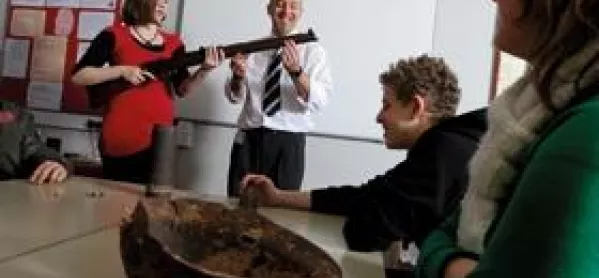Curriculum changes could spark supply crisis

Make teachers redundant or have them teach subjects they are not trained in - that is the stark choice cash-strapped secondaries will face if national curriculum changes proposed this week are introduced, ministers are being warned.
The bleak scenario is predicted by heads’ leaders and teacher recruitment experts if the Government follows the recommendation of its national curriculum review expert panel to make history, geography and modern foreign languages compulsory for all 11 to 16-year-olds from 2014.
University teacher training departments are also warning that the changes would increase the risk of the Government “sleepwalking” into a teacher supply crisis.
“There is no good having this new curriculum if you have people taking subjects they are not qualified to teach,” said Professor John Howson, a teacher supply specialist.
He foresaw difficulties for schools that do try to recruit qualified staff, predicting that geography would “very quickly” become a shortage subject. He also warned that extra language teachers needed for key stage 4 could be tempted away to work in primaries, where it is proposed that modern foreign languages would be made compulsory at key stage 2.
James Noble-Rogers, executive director of the Universities’ Council for the Education of Teachers, predicted the new KS4 - which the review recommends is expanded from two to three years - would exacerbate the pressures created by the English Baccalaureate. He said even history could become a shortage subject and called on ministers to consider giving trainee teachers with only 2:2 degrees bursaries for all subjects.
Brian Lightman, general secretary of the Association of School and College Leaders, said increasing numbers of secondary classes were already taken by teachers untrained in the subject. The new curriculum would continue the trend or lead to redundancies, he said, because schools had no money to take on extra teachers. He predicted that the pressure of “massive changes” demanded by the new curriculum would lead many of the thousands of new academies to exercise their legal right to ignore it.
“This just doesn’t seem as if the curriculum is being slimmed down as we were told it would be,” Mr Lightman added.
The panel acknowledges that “contrary to the intentions of the review to slim down the national curriculum, these (KS4) recommendations may appear demanding”. They suggest reducing requirements outside the core subjects of English, maths and science as a solution and stress that not all pupils should follow full GCSE courses in all statutory KS4 subjects.
Fears of curriculum overload will be heightened by the panel’s decision not to recommend the axing of any subject. Citizenship would, contrary to expectation, remain statutory in secondaries, alongside ICT and design and technology, which would be compulsory for all ages. There would be no national curriculum programmes of study for these subjects, leaving schools free to decide how to teach them. But the recommendation would mean much of the scope for teacher freedom would come under subject headings predetermined by central government.
The Government has decided to hold the introduction of the new curriculum in core subjects back a year and introduce it for all subjects in 2014. Rumours persist that delays in the review have been caused by ministers repeatedly rejecting the panel’s findings. But insiders insist it is actually down to the amount and importance of international evidence uncovered.
Whatever the truth, a blueprint for the curriculum has now been published. Months of consultation in one of the most politically charged areas of education will follow before we find out whether it makes it into the classroom.
REVIEW’S KEY POINTS - All existing national curriculum subjects should remain statutory, but schools should be left to decide how to teach citizenship, design and technology and ICT. - Knowledge should be set out by key stage, with the possible exception of primary maths, which could follow a year-by-year structure. - Oral language should be a “strong feature” of the curriculum. - KS2 should be divided in half, with new lower and upper stages. - KS3 should be shrunk to the first two years of secondary, and KS4 expanded to the final three years. - Current national curriculum “levels” should be replaced with more precise attainment targets. - All pupils should understand key elements of a body of knowledge before they move on to the next (this is the “ready to progress” measure). Origional headline: Curriculum changes could spark teacher supply crisis
Keep reading for just £1 per month
You've reached your limit of free articles this month. Subscribe for £1 per month for three months and get:
- Unlimited access to all Tes magazine content
- Exclusive subscriber-only stories
- Award-winning email newsletters



